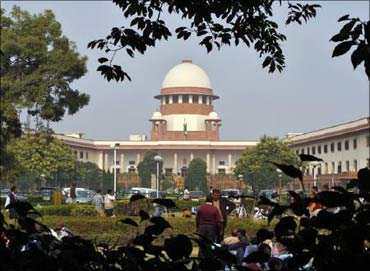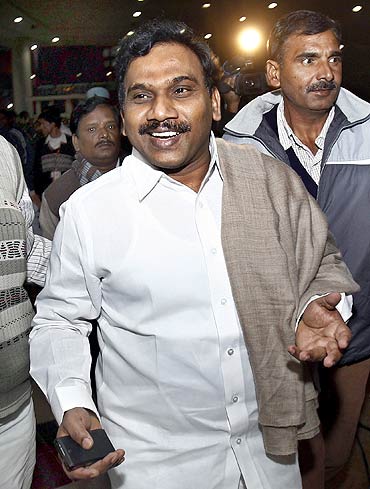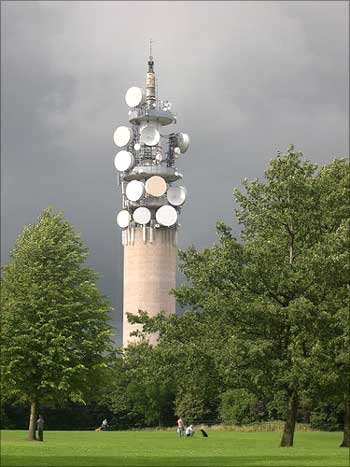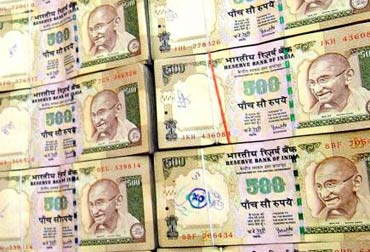 | « Back to article | Print this article |
Set up special court on 2G scam, SC tells govt
The Supreme Court on Thursday asked the government to constitute a special court to exclusively deal with the 2G spectrum scam that has caused a loss of Rs 1.76 lakh crore (Rs 1.76 trillion) to the exchequer.
The court said that the CBI probe should also cover culpability of beneficiaries of the scam as they are part of larger conspiracy.
The Supreme Court has been monitoring the CBI's investigation, which has included the arrest for former Telecom Minister A Raja, who resigned in November.
Raja has been accused of colluding with private telecom players to bend rules so as to ensure that they got licenses for mobile networks at low prices.
The CBI is probing the alleged irregularities in 2G spectrum allocations as it suspects collusion between government officials and private companies, to help the latter get spectrum at less-than-market value in lieu of kickbacks.
"The CBI," said the Supreme Court, "must have a free hand to question anyone. It appears that their freedom is curtailed as it is seeking short remand of the accused."
Click NEXT to read on . . .
Set up special court on 2G scam, SC to govt
"We have large number of persons who think themselves to be above the law. The law must catch up with them. Merely their being on the list of Forbes' millionaires does not make any difference," the Supreme Court said.
The Supreme Court asked the CBI to reveal who the conspirators in the scam are and place the chargesheet before it ahead of filing it before the special court.
The Supreme Court also directed that no other court will pass any order in connection with the 2G spectrum case as may impede investigation.
CBI said that it will complete the investigation into the spectrum allocation between 2001 and 2006 by May 31, by which time it will also file the first charge sheet in the case.
The CBI and Enforcement Directorate earlier placed the status report on the progress of the investigation into the case till date.
Click NEXT to read on . . .
Set up special court on 2G scam, SC to govt
After Swan, focus now on Unitech in 2G scam
Meanwhile, after the arrest of Swan Telecom promoter Shahid Balwa, the focus of the CBI was now on another real-estate house -- Unitech -- who earned a quick profit of nearly 267 per cent by off-loading 60 per cent of shares after getting spectrum in 2007-08.
Sources in the agency said that officials of the Unitech would be questioned soon again after the CBI was through with the interrogation of Shahid Balwa, promoted of Swan Telecom and Managing Director of DB group, a real estate house.
The charges against Unitech, according to the CBI's FIR, was that it offloaded 60 per cent of its shares to Telenor, a Norway-based telecom company and earned a profit of 267 per cent even before the roll out.
"M/s Unitech was allotted UAS licences for 22 circles for Rs 1,658 crore (Rs 16.58 billion). It offloaded its 60 per cent of shares in the licences to Telenor of Norway for Rs 6,100 crore (Rs 61 billion) even before the rollout," the FIR said.
Some of the officials of the Unitech have already been questioned by the CBI and the Enforcement Directorate and since now some more evidence had surfaced, there would be a fresh round of questioning, the CBI sources said.
Click NEXT to read on . . .
Set up special court on 2G scam, SC to govt
Efforts to seek comments from Unitech did not fructify. According to the FIR, "the estimated loss to the government by grant of licences to these two companies (Swan and Unitech) alone comes to Rs 7,105 crore (Rs 71.05 billion). On pro-rata basis, the estimated loss for all the 122 circles is more than Rs 22,000 crore (Rs 220 billion)."
Swan was allotted UAS licences for 13 circles for Rs 1,537 crore (Rs 15.37 billion) and it sold 45 per cent of shares before roll-out to UAE-based Etislat for Rs 4,200 crore (Rs 42 billion), the FIR said.
In a five-page FIR, CBI charged that the officials of the Department of Telecom and some private companies entered into a criminal conspiracy and caused wrongful gains to them. It said the licenses were issued at a very nominal rate based on prices fixed in the year 2001.
"As per the information received, all this was done in criminal conspiracy between DoT officials and private companies in order to award licences to the company for a heavy consideration by putting a cap on the number of applicants against recommendation of Trai and by awarding licences to private companies on first-come-first-serve basis on the rates of 2001 without competitive bidding," the FIR said.




